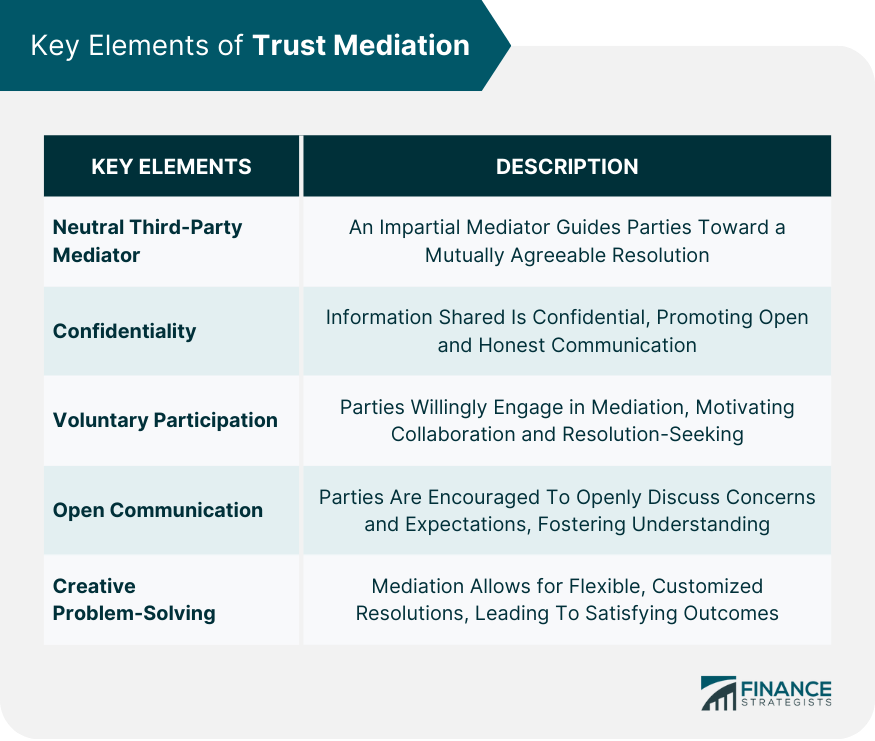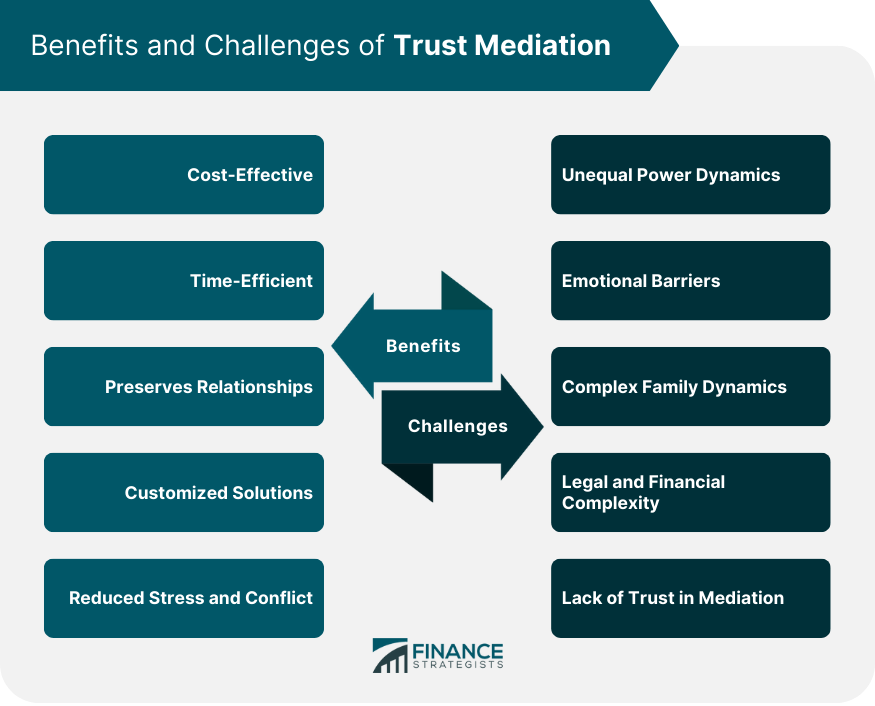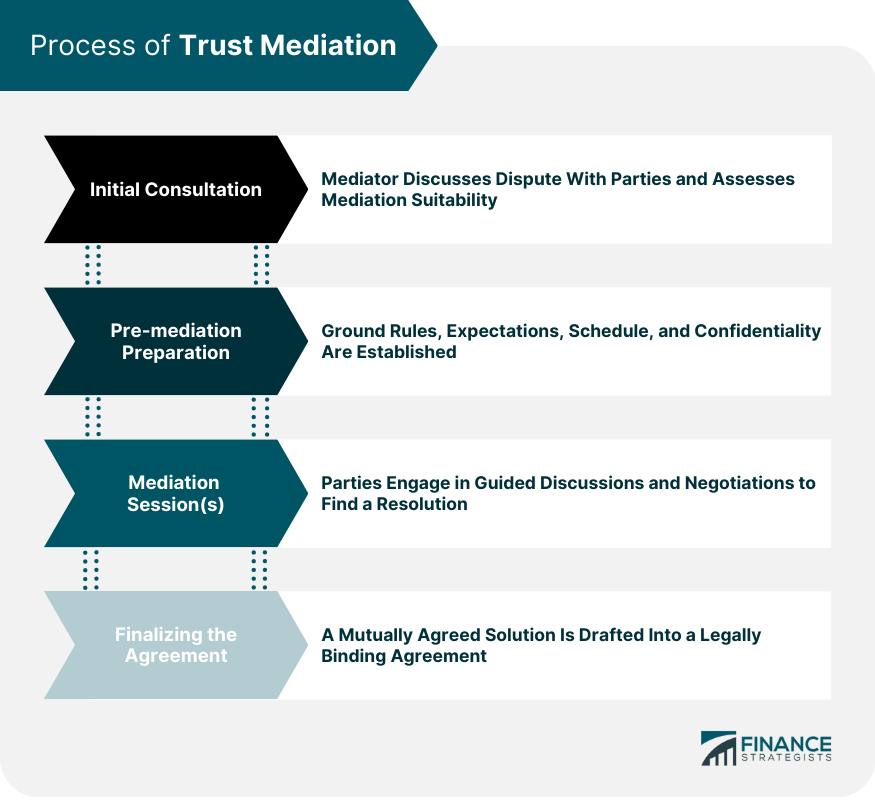Trust mediation is a method of alternative dispute resolution that involves a neutral third party guiding disputing parties through a process to reach a mutually agreeable solution. This process is often employed in estate planning to resolve conflicts and disagreements among family members or other parties involved in the administration of a trust. The primary purpose of trust mediation is to provide a structured, cooperative environment for parties to address their concerns and work towards a resolution, avoiding the need for costly and time-consuming litigation. Trust mediation seeks to foster open communication, promote understanding among parties, and explore creative solutions to meet the needs of all involved. Trust mediation is an essential tool in estate planning, as it provides a means for parties to address disputes without resorting to court proceedings. This can help preserve relationships, minimize the potential for additional conflict, and ultimately save time and money for all parties involved. A crucial element of trust mediation is the presence of a neutral third-party mediator. This individual has no vested interest in the outcome of the dispute and is trained to facilitate open communication and guide parties toward a mutually agreeable resolution. The mediator's impartiality is essential in establishing an environment of trust and fairness. Trust mediation operates on the principle of confidentiality. All discussions and information shared during the mediation process are considered confidential and cannot be used as evidence in court should the parties fail to reach an agreement. This confidentiality encourages open and honest communication, allowing parties to fully explore their concerns and potential solutions without fear of legal repercussions. Another key aspect of trust mediation is voluntary participation. Parties involved in the process choose to engage in mediation willingly, with the understanding that they are not compelled to reach an agreement. This voluntary nature ensures that parties are motivated to collaborate and find a resolution that meets their needs. Open communication is a cornerstone of trust mediation. The mediator encourages parties to openly discuss their concerns, feelings, and expectations, which can lead to a better understanding of each other's perspectives. This open dialogue can help break down barriers and foster empathy, promoting a more collaborative environment for problem-solving. Trust mediation enables parties to engage in creative problem-solving. Unlike court proceedings, which often impose rigid solutions, mediation allows for flexibility in developing customized resolutions tailored to the unique needs and circumstances of the parties involved. This can lead to more satisfying outcomes and stronger long-term relationships. Trust mediation is often more cost-effective than traditional litigation. Court proceedings can be expensive and time-consuming, with legal fees and other costs quickly adding up. In contrast, mediation tends to be more affordable, as it requires fewer resources and generally involves a quicker resolution. As trust mediation is typically a faster process than litigation, it can save parties valuable time. Resolving disputes through the court system can take months or even years, while mediation often results in a resolution within a few sessions. This time efficiency allows parties to move forward and focus on other aspects of their lives. Trust mediation can help preserve relationships among family members and other parties involved in estate planning. By encouraging open communication and fostering understanding, mediation can minimize animosity and promote cooperation, leading to stronger, more enduring relationships. The flexibility of trust mediation allows parties to develop customized solutions tailored to their unique needs and circumstances. This can lead to more satisfactory outcomes and help ensure that all parties' concerns are addressed. Trust mediation can help reduce stress and conflict among disputing parties. By providing a structured, collaborative environment, mediation can alleviate tension and promote a more amicable resolution. This can result in a more positive experience for all parties involved and help minimize the emotional toll associated with estate disputes. One potential challenge in trust mediation is addressing unequal power dynamics between parties. These imbalances can make it difficult for some individuals to express their concerns or feel heard. A skilled mediator will work to recognize and address these dynamics, ensuring that all parties have an equal opportunity to participate and voice their needs. Emotions can sometimes create barriers in the mediation process, making it difficult for parties to communicate effectively or reach a resolution. Mediators must be skilled in managing emotions and helping parties navigate their feelings to maintain a productive and cooperative atmosphere. Complex family dynamics can pose challenges in trust mediation, as existing relationships and past conflicts may influence the process. The mediator must be mindful of these dynamics and work to create a safe and respectful environment that allows all parties to address their concerns. Trust disputes can involve complex legal and financial issues that may be difficult to navigate during mediation. In such cases, the mediator may need to consult with legal and financial experts to ensure that all parties understand the implications of their decisions and are able to make informed choices. Some parties may be skeptical of the mediation process or lack trust in its ability to produce a fair and satisfactory resolution. This lack of trust can hinder the process and make it difficult to reach an agreement. The mediator must work to build trust among parties and demonstrate the potential benefits of mediation. The trust mediation process begins with an initial consultation, during which the mediator meets with the parties to discuss their concerns and gather information about the dispute. This consultation helps the mediator gain an understanding of the issues at hand and determine whether mediation is an appropriate method for resolving the conflict. During the pre-mediation preparation phase, the mediator works with the parties to establish ground rules and expectations for the mediation process. This may include discussing the role of attorneys, setting a schedule for mediation sessions, and outlining the confidentiality agreement. The core of the trust mediation process is the mediation session(s), in which the mediator guides the parties through open discussions and negotiations to address their concerns and work toward a resolution. The number and length of these sessions will depend on the complexity of the issues and the willingness of the parties to collaborate. Once the parties have reached a mutually agreeable solution, the mediator will help them draft and finalize a written agreement outlining the terms of their resolution. This document serves as a legally binding contract, ensuring that the parties adhere to the agreed-upon terms. Attorneys play a critical role in trust mediation by advising their clients on legal issues and potential outcomes. They help their clients understand their rights and responsibilities, as well as the implications of various settlement options. Attorneys may also participate in the mediation process, offering legal guidance and support to their clients. They can provide valuable insights into the legal aspects of the dispute and help ensure that their clients make informed decisions. Once a resolution has been reached, attorneys may be involved in drafting and finalizing the written agreement. They ensure that the document accurately reflects the terms of the settlement and complies with applicable laws and regulations. Trust mediation is an effective method for resolving estate planning disputes, offering numerous benefits such as cost-effectiveness, time efficiency, preserved relationships, customized solutions, and reduced stress and conflict. Key elements of trust mediation include the neutral third-party mediator, confidentiality, voluntary participation, open communication, and creative problem-solving. However, challenges such as unequal power dynamics, emotional barriers, complex family dynamics, legal and financial complexity, and lack of trust in mediation may arise during the process. To ensure a successful trust mediation process, it is important to select a skilled and experienced mediator who can navigate complex dynamics and foster an environment of open communication and collaboration. Engaging legal counsel during the process can provide valuable guidance and ensure that the resulting agreement is legally sound. Finally, parties should approach the process with an open mind and a willingness to work together, allowing for the possibility of a mutually satisfactory resolution that addresses the needs and concerns of all involved.What Is Trust Mediation?
Key Elements of Trust Mediation
Neutral Third-Party Mediator
Confidentiality
Voluntary Participation
Open Communication
Creative Problem-Solving

Benefits of Trust Mediation
Cost-Effective
Time-Efficient
Preserves Relationships
Customized Solutions
Reduced Stress and Conflict
Challenges of Trust Mediation
Unequal Power Dynamics
Emotional Barriers
Complex Family Dynamics
Legal and Financial Complexity
Lack of Trust in Mediation

Process of Trust Mediation
Initial Consultation
Pre-mediation Preparation
Mediation Session(s)
Finalizing the Agreement

Role of Attorneys in Trust Mediation
Advising Clients
Participation in Mediation
Drafting and Finalizing the Agreement
Final Thoughts
Trust Mediation FAQs
Trust mediation is a conflict resolution process that involves a neutral third party helping disputing parties to build trust, communicate effectively, and reach a mutually acceptable resolution. In estate planning, trust mediation can help resolve disagreements among family members, beneficiaries, or other involved parties, ensuring a smooth execution of the estate plan and preserving relationships.
Trust mediation can be utilized to address conflicts that may arise during the estate planning process, such as disagreements over asset distribution, power of attorney appointments, or guardianship decisions. By fostering open communication and mutual understanding, trust mediation can help parties reach a consensus and create a more harmonious estate plan.
Yes, trust mediation can be an effective preventive measure to avoid disputes related to inheritance and asset distribution. By involving a trust mediator during the estate planning process, open communication and understanding can be established among family members and beneficiaries, resulting in a well-structured estate plan that takes into account the needs and wishes of all involved parties.
It's a good idea to consider trust mediation in estate planning when there are complex family dynamics, potential conflicts among beneficiaries, or disagreements about the provisions in a will or trust. Trust mediation can help resolve these issues constructively and ensure that the estate plan is designed in a way that satisfies the needs and wishes of all involved parties.
To find a trust mediator with experience in estate planning, consider searching for mediators who specialize in this area, seeking recommendations from your estate planning lawyer, or contacting local mediation centers for referrals. It's important to select a trust mediator with a strong background in estate planning to ensure they have the necessary expertise to address the unique challenges that may arise in this context.
True Tamplin is a published author, public speaker, CEO of UpDigital, and founder of Finance Strategists.
True is a Certified Educator in Personal Finance (CEPF®), author of The Handy Financial Ratios Guide, a member of the Society for Advancing Business Editing and Writing, contributes to his financial education site, Finance Strategists, and has spoken to various financial communities such as the CFA Institute, as well as university students like his Alma mater, Biola University, where he received a bachelor of science in business and data analytics.
To learn more about True, visit his personal website or view his author profiles on Amazon, Nasdaq and Forbes.















